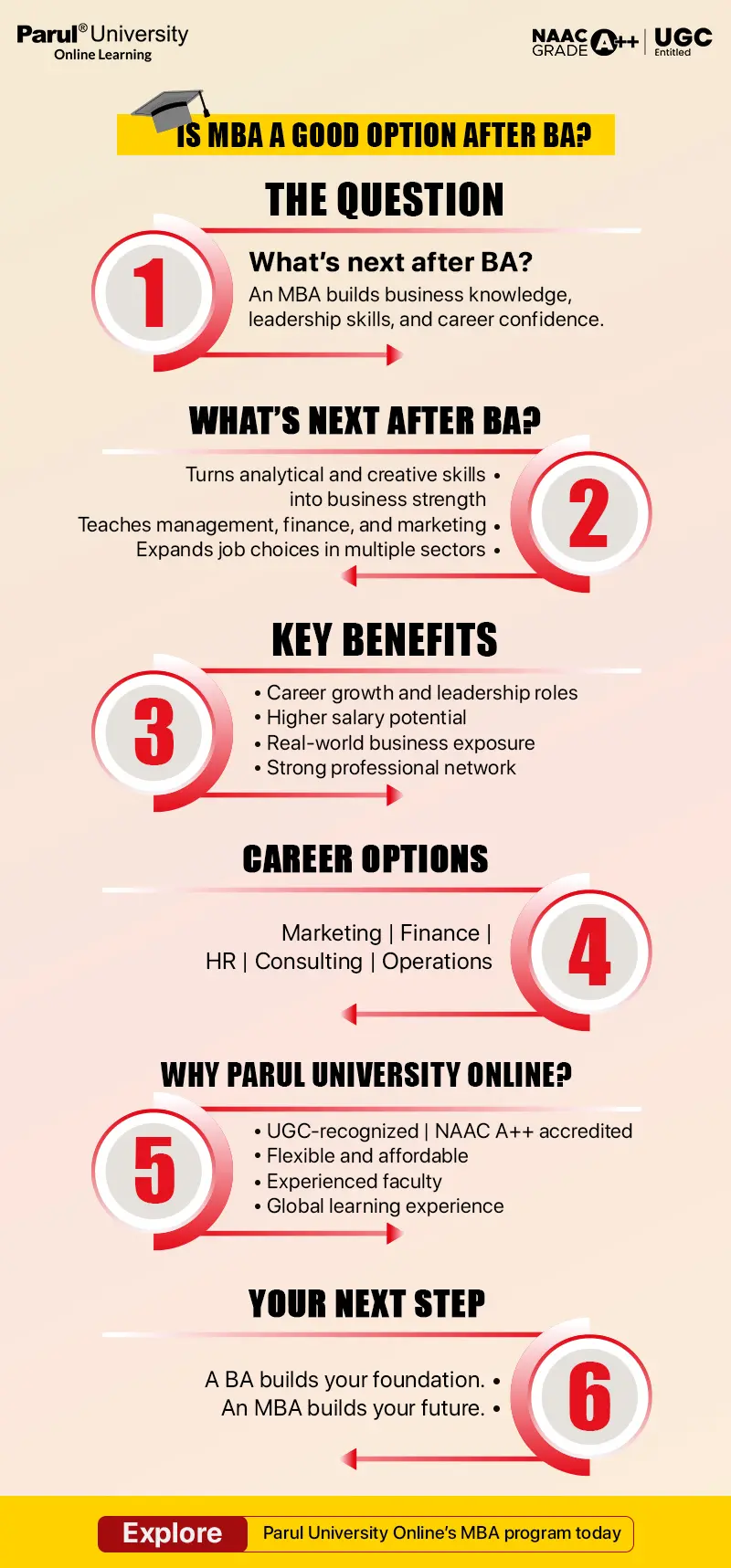Is MBA a Good Option After BA? Pros, Cons, and Career Scope
Understanding the Question
Many students complete a Bachelor of Arts and then begin thinking about their next step. Some want to specialize further, and others want a professional degree that leads to managerial roles. The question that often comes up is whether pursuing an MBA after a BA is a good idea.
The decision depends on your interests, goals, and the type of career you want to build. An MBA helps you gain business knowledge, leadership ability, and decision-making skills. These are important skills in almost every field today.
Why Students Consider an MBA After BA
Graduates who complete an online bachelor’s degree in India often want careers that combine management, creativity, and strategic thinking. A BA develops communication and critical thinking skills. Many graduates look for ways to apply these strengths in professional settings.
An MBA builds on your BA foundation and introduces you to key business areas such as marketing, finance, human resources, operations, and strategy. These subjects help you understand how businesses function and how leaders make decisions.
Students from humanities backgrounds often perform well in MBA programs. They bring analytical thinking and strong interpersonal skills, which are useful when solving problems, leading teams, or developing new ideas.
Advantages of Pursuing an MBA After BA
Studying for an MBA after a BA brings personal and professional advantages.
- More Career Opportunities – An MBA opens up jobs across industries. You explore business development, marketing, finance, consulting, and management roles. Companies value diverse educational backgrounds because they bring different perspectives to business decisions.
- Leadership Development – An MBA focuses on leadership and practical management. You learn how to handle projects, lead teams, and manage resources. These skills prepare you for strategic and leadership roles.
- Better Understanding of Business – A BA helps you understand people and society. When you combine it with an MBA, you develop a complete view of organizations and markets. You learn to think critically and make thoughtful decisions.
- Higher Earning Potential – The report says that MBA professionals often earn more than graduates with only an undergraduate degree. Employers prefer candidates who have both leadership and business management skills.
- Networking and Industry Exposure – MBA programs help you meet professionals from different sectors. These networks lead to internships, mentorship, and better job opportunities. You learn from faculty and peers who bring practical experience to class.

Is MBA a Good Option After BA? Pros, Cons, and Career Scope
Challenges of Pursuing an MBA After BA
An MBA after a BA is a rewarding choice, but it also requires effort and preparation.
- New Subjects: Non-business students find finance and accounting new at first, but foundation courses make them easier to understand.
- Financial Planning: An MBA requires investment of time and money. Choosing an accredited online bachelor’s degree followed by an online MBA helps you save costs while keeping quality intact.
- Time Commitment: MBA programs are intensive and require consistent participation.
These challenges are manageable and often worth the effort once you see the results.
Career Scope After MBA
The career scope after an MBA is wide and varied. Graduates work in fields like banking, consulting, marketing, education, and public administration.
Popular career roles include:
- Marketing Manager – Overseeing branding and marketing strategies
- Financial Analyst – Analyzing business performance and helping leaders make informed choices
- Human Resource Manager – Managing teams and building organizational culture
- Business Consultant – Helping companies improve performance and solve complex issues
- Operations Manager – Managing productivity, logistics, and operations
The report says that India’s demand for management professionals is rising, especially in finance, technology, and services. Businesses prefer graduates who understand both strategy and operations.
Why MBA Is Suitable for BA Graduates
A Bachelor of Arts degree helps you build analytical and communication skills. These qualities make a strong foundation for management studies. You already know how to research, reason, and interpret human behavior, which helps you manage people and projects effectively.
An MBA adds business knowledge to your skills. You learn how to manage resources, plan strategies, and make data-based decisions. The mix of creativity from your BA and structure from your MBA makes you adaptable and effective in different situations.
Why Choose Parul University Online for Your MBA
If you plan to pursue an MBA after your BA, Parul University Online offers an excellent platform to continue your education while balancing other responsibilities. The university is UGC-recognized and NAAC A++ accredited, so its degrees are trusted worldwide.
Highlights of Parul University Online MBA:
- Flexible online classes and recorded lectures
- Faculty with academic and industry experience
- Updated and practical study material
- Affordable fees
- Career guidance and placement support
The MBA program at Parul University Online focuses on practical learning. You work on projects, case studies, and business simulations that mirror real industry scenarios. The program helps you develop the skills needed for both corporate and entrepreneurial success.
Students who complete an Online BA or an online BA course in India find this transition to an online MBA smooth and well-structured.
How to Prepare for MBA After BA
The shift from arts to business studies feels easier when you plan ahead. A few simple steps make the process smoother.
- Learn Business Basics: Study basic accounting, marketing, and management concepts through books or online videos.
- Build Quantitative Skills: Practice arithmetic and logical reasoning. These are useful in business studies and aptitude tests.
- Improve Professional Skills: Work on communication, teamwork, and presentation abilities.
- Select the Right Specialization: Choose between Finance, HR, Marketing, or Operations based on your BA background and interests.
- Explore Online Learning: If you prefer flexibility, an online BA followed by an online MBA is a practical route.
These steps help you enter your MBA program with confidence.
The Future After an MBA
An MBA opens pathways to continuous professional growth. Graduates explore leadership roles in business and even start their own ventures. Employers look for professionals who understand management, strategy, and innovation.
The report says that MBA graduates are in demand in consulting, finance, and technology. Online learning now makes it easier to earn an MBA while working, which gives you both education and experience.
An MBA after a BA helps you think like a manager and prepares you to contribute effectively in organizations. It is not just a degree but a shift toward leadership and vision.
Conclusion
An MBA after a BA is a smart and practical choice. It allows you to apply your communication and analytical strengths to real business situations. The combination of BA online admission and an MBA helps you build a complete skill set that employers respect.
Parul University Online gives you a reliable platform for this journey. Its programs are approved by UGC and designed for flexibility and quality. You learn from expert faculty, interact with peers from diverse backgrounds, and gain skills that prepare you for the modern business world.
If you are exploring options after your online BA, an MBA from Parul University Online helps you move ahead confidently. It allows you to study from anywhere while building a strong foundation for your career.
Explore Parul University Online’s UGC-approved MBA program and take the next step toward your professional growth.
Visit Parul University Online and begin your journey toward leadership and business excellence.






